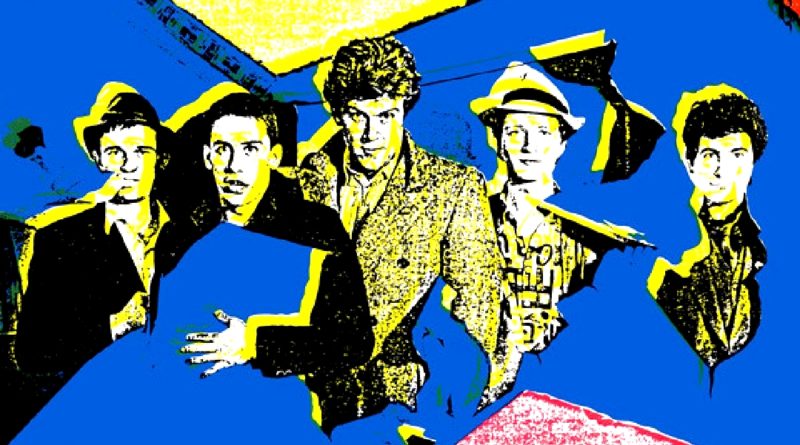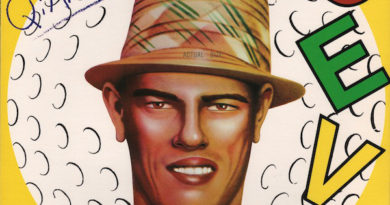Argybargy at 40: When Squeeze’s Geeky Gambit Went Global
Four decades ago Difford and Tilbrook made the New Wave safe for nerds

On paper, Argybargy shouldn’t have worked, at least not in the U.S. But in fact the 1980 album began America’s infatuation with Squeeze, which boosted the British band into the New Wave’s upper echelon.
But before we even begin to get into the music, let’s just look at the album title. Webster lists “argy-bargy” as “a lively discussion: argument, dispute” but the real takeaway is the description “chiefly British,” which is also a pretty accurate summation of the record itself.
We are after all talking about an album whose biggest single and lead-off track, “Pulling Mussels (from a Shell),” bears the opening line “They do it down on Camber Sands,” referencing a British seaside vacation destination not exactly ingrained in American cultural consciousness. By the time you get to “in for bingo all the nines” later in the same song, it starts to seem like a U.K.-to-U.S. slang dictionary is in order. The phenomenon continues as the album moves along, from the “breakfast at half seven” in “Separate Beds” to the “car front deals and after pubs” of “I Think I’m Go-Go.” Let’s put it this way: When Tilbrook sings “the fish and chips smell lingers” on “Vicky Verky” it’s truer than he realizes.

But even putting Brit-centric qualities aside, the lyrics on Argybargy, when viewed outside their sonic context, seem like they should have been too quirky for mainstream acceptance. Consider the second verse of “Pulling Mussels,” which goes in part, “Squinting faces at the sky/A Harold Robbins paperback/Surfers drop their boards and dry/And everybody wants a hat.” And if anyone has yet divined the true meaning of the same song’s chorus couplet “And I feel like Wiliam Tell/Maid Marian on her tiptoe feet pulling mussels from the shell” the discovery has yet to be documented for posterity.
Things get no less knotty on “If I Didn’t Love You,” another big Argybargy single, which opens with “If I didn’t love you I’d hate you/Watching you play in the bath/A soap suds stickleback navy/A scrubbing brush landing craft.” (For those keeping score at home, a stickleback is a breed of freshwater fish). But the secret formula to Squeeze’s success lies in the way lead singer Glenn Tilbrook could take his bandmate Chris Difford’s most gloriously idiosyncratic lyrics and mate them with irresisitible pop melodies. And that working dynamic reached an arguable peak here on the band’s third album.
VIDEO: Squeeze perform “If I Didn’t Love You” in Milwaukee, WI, 9/1/19
The first two Squeeze albums, their self-titled debut and 1979’s Cool For Cats, made plenty of headway on the home front, but the band was strictly a cult phenomenon in the U.S. before Argybargy. Technically, none of the album’s singles was actually a stateside chart hit, but nevertheless, American rock radio listeners couldn’t avoid “If I Didn’t Love You,” “Pulling Mussels,” and “Another Nail for My Heart” if they tried. Though Squeeze’s next album, 1981’s East Side Story, would give the band a bigger bump up in America, Argybargy quickly shot them into the stratosphere of New Wave acts deemed acceptable to the U.S. mainstream, alongside the likes of Elvis Costello (who would co-produce Squeeze’s next LP), Blondie, The Police, and The Cars.
Even a cursory listen to Squeeze’s 1977 EP Packet of Three reveals that the band began in a punkier place. But by the time Argybargy burst into being, the influence of ‘60s British Invasion godheads like The Beatles and The Kinks became apparent, defining one of the keys to Squeeze’s blooming popularity. In the early ‘80s, the songwriting team of Difford and Tilbrook was compared to Lennon & McCartney so many times it’s a wonder Allen Klein didn’t come sniffing around waving management contracts.
VIDEO: Squeeze “Another Nail In My Heart”
Certainly the combination of melodic gut punches and left hooks that defined The Beatles at their best is at work on Argybargy. But the unique musical personalities of the players are what brought it all home. In Jools Holland (who was soon to split) they had an irreplaceable keyboardist who could contribute the barrelhouse piano solo on “Pulling Mussels” one moment and the angular New Wave synth spurts on “Another Nail for My Heart” the next. Tilbrook was not only an endearingly sunny-voiced singer but a dazzlingly fluid lead guitarist. Taken on its own, Difford’s low, buzzing vocal tones resembled nothing so much as a power mower with a tree branch stuck in its blades, but somehow it was only when he chimed in an octave below Tilbrook for their signature vocal sound that the whole thing came together.
From future classics like the aforementioned singles to the trippy travelogue of “Misadventure” and the addled alienation of “I Think I’m Go-Go,” the songs on Argybargy burst with enough lyrical and musical invention to last most bands for their entire careers. Ultimately what the album said to the world was that it’s not merely acceptable but unassailably cool to be gnomically offbeat, whip-smart, and full of arch humor.
The Nutty Professors of the New Wave had arrived, and school was in session.





One of my favorite bands of the New Wave era; I can remember seeing the “Another Nail for My Heart” on VH1 (“8-Track Flashback,” hosted by the late David Cassidy) and thinking that was an amazing song. I have a CD copy of “Singles – 45’s and Under” that I bought on a school field trip to NYC back in 1997. I think this article inspired me to go back and listen to Argybargy over the weekend.